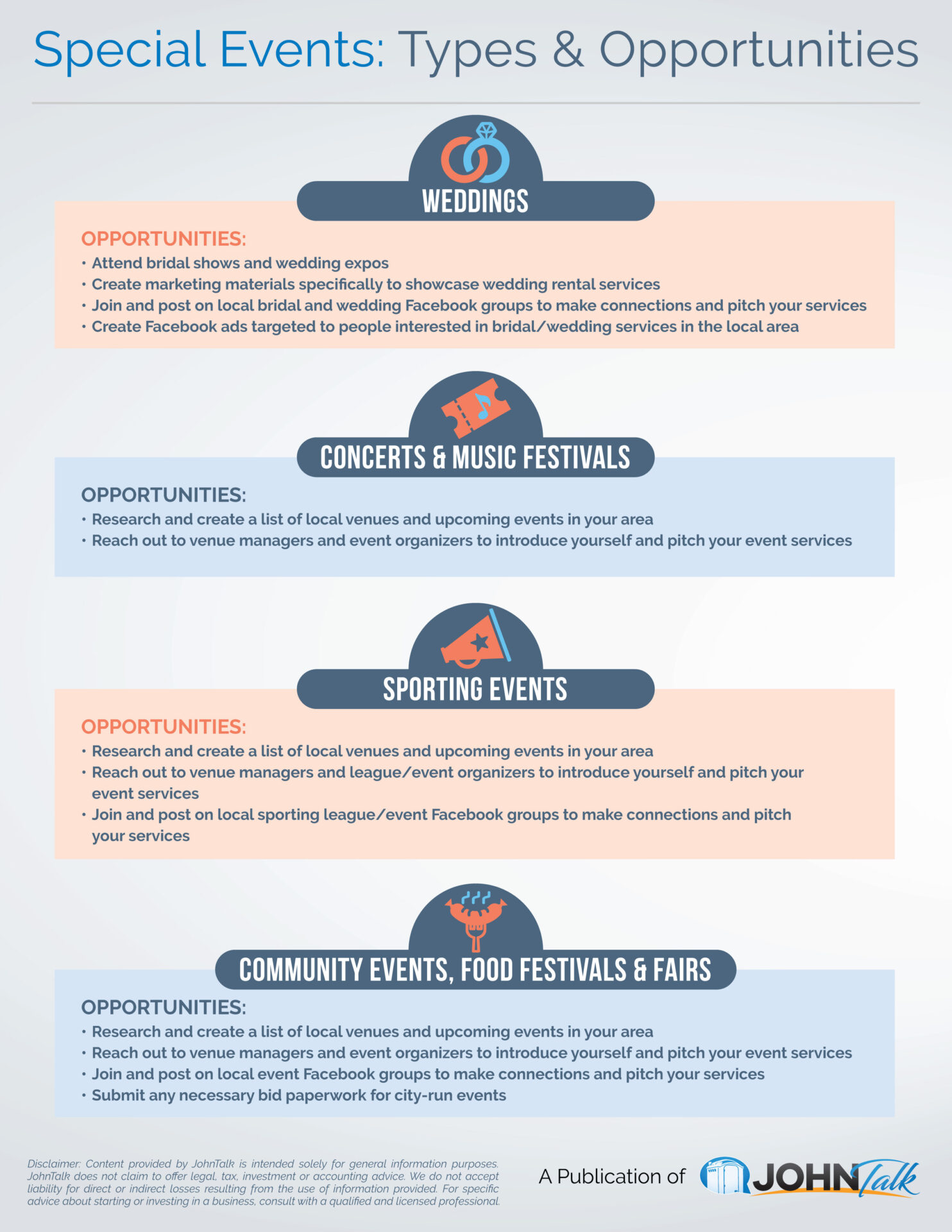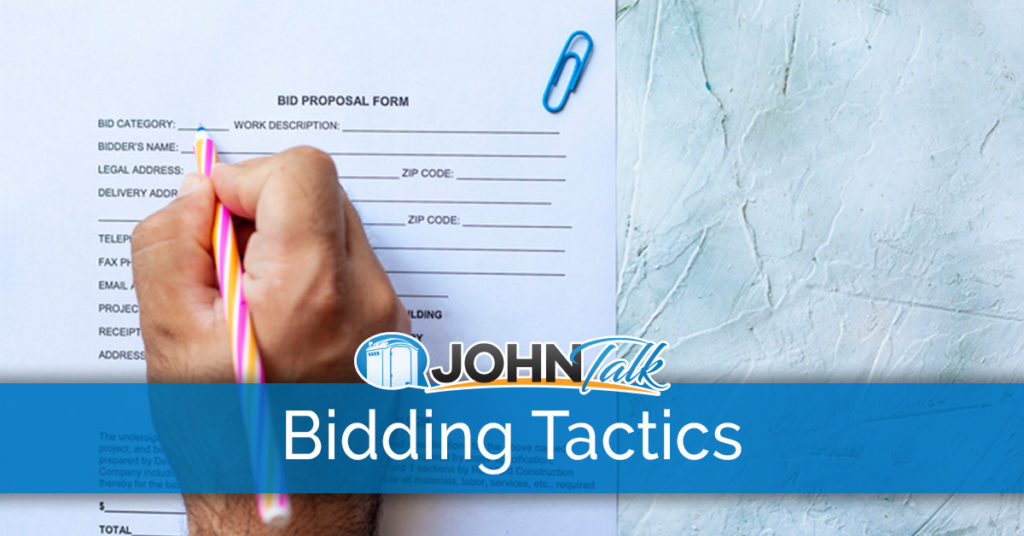
INFOGRAPHIC: Special Events: Types & Opportunities
March 16, 2020
Cleaning Procedures During the Coronavirus Outbreak
March 18, 2020There are many ways to look at bidding. Bidding is a process. It’s a competition. It’s a sales presentation. You want to deliver value to the customer and at the same time earn a fair profit. Both parties want the same goal – a refreshing sanitary experience for the end-users. Bidding is a real balancing act!
A bidding request for portable sanitation services can come from every type of customer. As a result, every bid you make is unique.
For PROs, bidding is a key business skill that you can learn and continually improve the more you use it.
Make these considerations part of your bidding process to help generate winning bids and satisfied customers:
- Brand
- Research
- Tactics
- Cost
- Service Standards
- Post-Bid Review
Separately, we’ll also review bidding on federal contracts.
Brand
Your bidding starts with your brand.
Your brand is how you present your company to the public. It is your unique message and your core values that make it stand out from your competitors.
At an early point in the bidding process, you will have to make a bid/no-bid decision. Use your brand to help decide if the job is right for you.
The job you bid on should fit your company profile. They should be in sync. Your bids will be on more solid footing when the jobs will bring out the best in your company. If not, you’re probably wasting time that could be better spent on other aspects of your business.
If you are undecided about a bid and how it fits your brand, it may help to review your business plan. Review your projected goals and timeline for growth. Are you at a point when you were planning to move into high-end events, for example? In that case, a potential job you wouldn’t have considered earlier is now exactly what you want to bid on.
Be self-aware and confident about your company brand when you bid.
Research
Once you’ve decided to proceed with your bid, or if you still need more information, do your research. Bid requests usually give you all the information you need, but having additional background can be beneficial.
First, research the company or organization offering the project. Check out their websites and search for news articles that may offer some insight into the way they conduct business, such as their mission and values or news releases about their involvement in the community.
For a more balanced viewpoint, you can get a good idea of a company’s standing in the business community through the Better Business Bureau and by contacting your local Chamber of Commerce. For more personal information, network with your contacts in the community, and check social media sites for reviews and to network with others who have done work for them.
You may even have personal experience. If you’ve attended an event you are now bidding on, what did you notice? Was the event was well-organized, especially the portable sanitation? Have you seen previous worksites of the company that is putting the work up for bid? Were the units securely located? Easily accessible? Was the worksite generally clean? If you are bidding on a municipal job, have you worked with them before? Was the department well-run?
If possible, research the other bidders – your competitors. Follow the same routine – their websites, social media, networking, etc. Your goal is to know their strengths and weaknesses. You may be able to adjust aspects of your bid to counter their advantages and take greater advantage of their limitations.
Finally, research the local economic conditions. The Chamber of Commerce and local Economic Development organizations can be of great help here. If there is a construction boom, for example, it might be harder for construction companies to get the units they need, so they might be willing to pay a higher premium. Or, if a rainy spring results in a less productive growing season, the need for units in the agricultural market may be less.
Research can help you fine-tune your bid. It can alert you to any red flags that aren’t obvious from the bid itself, such as a company with a poor reputation. Research can boost your bid. Your knowledge of a company or organization shows them that you do your homework. You position yourself as responsible and well-prepared. They can assume that your dedication will likely carry over into the service you provide.
Tactics
Here are some tips and strategies to help you evaluate bids and boost your chances.
Select Projects That Fit Your Strengths
You can save a lot of time by focusing first and foremost on bids that you feel most confident about. You’ll know a good opportunity when you see it. You can fulfill all the requirements of the bid. There are no scheduling conflicts with your other jobs. You may be familiar with and on good terms with the company, organization, municipality or individual asking for the bid. The bid matches the core values as set in your business plan. This is a “quality bid.”
If you have several opportunities to bid, put them in order of how well they fit your strengths, and devote more time to the bids that have the greatest chance for success. Bidding to your strengths doesn’t mean you have to abandon the other bids. It just means to keep your priorities in order.
However, if you’re not a perfect fit for a bid, but you know that the other bidders aren’t either, then the bid is an opportunity worth taking. That’s when additional research into other bidders can pay off.
Make Sure You Have the Inventory, Time and People to Do the Work
This sounds obvious, but always look at your bid opportunities from a logistics standpoint. Do the math. You have x number of units. It will take x number of hours to deliver, set up and clean units. It will cost you x amount of dollars for fuel to transport the units and in dumping fees. You have x number of units committed to other jobs at the same time. You can expect to use x amount of supplies. You may have to pay your driver x dollars in overtime.
Maintaining control of your labor and material costs allows you to make a lean, precise bid, which could mean the difference between winning the bid or getting shut out. Also, you won’t find yourself in the situation where you have to absorb extra costs after you’ve been awarded the bid.
Look for Projects That Offer Repeat Business
Winning a one-time bid is great. Winning a bid that keeps on giving you business is even better, such as public events, business get-togethers and holiday celebrations that are held regulary (monthly, quarterly, yearly).
Once you win the bid and get your foot in the door, you have the upper hand in future bids. It’s a lot less hassle for organizers to continue with vendors they know.
Try to Meet with the Decision-Makers
Call and ask to set up an appointment. A face-to-face meeting allows you to get to know the customer and to demonstrate your professionalism.
An important goal is not just for you to meet them, but for them to meet you. Arrive on time, and be prepared to talk about your company and answer their questions. Their questions and concerns are ways to get to know them better. Show your enthusiasm for your work and the work you’re bidding on. Come with questions that demonstrate you’ve studied the bid. Questions that can help focus your bid are:
- What aspects of the job are critically important?
- What criteria will you use to evaluate the bids?
- What are some qualities that would make a bidder stand out?
Ask to Take a Site Tour
Similar to the interview, a site tour offers the opportunity of a face-to-face meeting with the decision-makers. You can show them that you take preparation seriously by asking about traffic patterns, road closures and the location of the units in relation to the other aspects of the event. Arrive at the site looking your best – in a clean uniform if you wear one, truck washed, with one of your best units. If you can’t arrange a tour and you’re bidding on an event that occurs regularly, request a map of the previous event.
Stay in Touch
Once you’ve met with the decision-makers, keep the lines of communication open. Send a quick thank-you (phone, email or text) so they have your contact information handy. It’s not obtrusive, for example, to send a marketing email to announce an upgrade of your units or service. Don’t be pushy and overdo your messages.
Get the JohnTalk “ALL-ACCESS PASS” & become a member for FREE!
Benefits Include: Subscription to JohnTalk Digital & Print Newsletters • JohnTalk Vault In-Depth Content • Full Access to the JohnTalk Classifieds & Ask a PRO Forum
Cost
How do you come up with that all-important dollar amount of your bid? Every bid is different, but we do have some recommendations.
Don’t Bid at or Below Cost
PROs in the earliest stages of ownership may try this strategy because they’re just getting started in the business and need some experience to build on. But it’s simply unsustainable as a business practice – you can’t get anywhere. It’s also an unsatisfying experience. Other potential customers will expect the same low prices. Bidding at or below cost puts you in a hole from the start.
Ask for a Ballpark Figure
Knowing a price range or even the exact amount of the last successful bid for the same event or contract is a great start.
First, it will immediately tell you if you can make a competitive offer. Second, it can serve as a reference for current and future bidding. Calculate your bid separately from the ballpark figure and see where your figure lands.
All things being equal (there are no drastic changes to the contract, for example), your bid should be higher than the previous amount because you are “selling” better service. Were you on the low side or high side?
Add Indirect and Fixed Expenses
As mentioned above, start by taking an inventory of everything you will need for the bid: units, supplies, transportation, fees, manpower and time.
With your direct expenses computed, you next need to add indirect and fixed expenses for a more accurate cost of the project.
These are the costs of doing business that aren’t charged to a specific project, but rather contribute to all projects. They include insurance and advertising, for example. For additional information on the cost of doing business, click here. Some accounting software includes a feature to automatically generate these costs for your bid.
Add Your Markup
Lastly, add your profit markup to your final calculations. A successful event bid could result in an ongoing contract, so add a markup that reflects the value of your services. As above, accounting software may offer a markup system feature to help calculate this key requirement of your bid.
Service Standards: Sell Your Services, Not Your Price
While price is certainly a key factor in winning a bid, every bidder will offer a dollar amount, probably close to yours. You need to differentiate your brand by showing how you deliver the best value for money.
Customers are usually willing to pay more when you have a reputation for quality. For construction and other industries, you may need to present your services as a trouble-free experience that the customers don’t have to think twice about. For business-oriented and public events, it may be your ability to deliver a premier customer experience.
In general, emphasize:
- Expertise and experience
- Customer service and support
- Reliability
- Quality of your inventory
- Reputation based on customer reviews
Safety First
Emphasize how critical safety is in your company culture. If you can’t state it in the bid, say it in person during an interview or site tour. (It also helps to have a safety statement on your website.) You may need to add safety to your bid, such as adding extra time for cleaning if you have to maneuver your truck through crowds during the event.
Post-Bid
Whether you win or lose the bid, there is still plenty of work to do.
Losing the Bid
- Stay optimistic – Don’t be discouraged. Every bid is an opportunity to improve your bidding skills.
- Follow up – Ask the customer to detail the strengths and weaknesses of your bid. Use this information to help guide your future bids.
Winning the Bid
- Follow through – When you win the bid, you’ve only just started. You have to deliver on everything you’ve committed to doing. Fulfill the bid to the best of your capabilities. Don’t just meet your customers’ expectations – go above and beyond.
- Review the event with the customer – A winning bid is an opportunity to create a business relationship. Follow-through by connecting with the decision-makers after the event. Ask them to review the positives – and any negatives – of your work. What comments did they hear from the event attendees? Be sure to add your input. Compliment the event, giving specifics (such as ease of access to the site, well-located units, etc.). Offer additional suggestions to improve the portable sanitation services.
- See if you can lock-in the event – Once you’ve successfully demonstrated your capabilities, you have the inside track to repeat business. Soon after the event concludes, ask the decision-makers if they are willing to contract your company for the next time. You might strengthen your hand by offering an incentive-based long-term commitment, such as a discount for a 3-year agreement.
When negotiating a long-term contract, include inflation in your calculations. Although there is no guarantee of accuracy, many prominent financial companies and organizations offer inflation forecasts that may be helpful.
If you can’t get an early signing, don’t take the repeat opportunity for granted. Your competitors will be coming in with new bids the next time around, so prepare to up your game, too.
- Get a testimonial – Testimonials now include reviews on social media. Photos of your units at the event also make good marketing. For more information, read the SBA blog “Customer Testimonials: Maximize Their Marketing Impact” at https://www.sba.gov/blog/customer-testimonials-maximize-their-marketing-impact.
- Maintain communication – Periodically send an email or text that references your business in a positive way, such as a customer review or a blog post about an upgrade to your services.
Review Your Bidding in General
With each bid, you add more information that can help in the future. Take an overview of your efforts. If you find yourself winning more event bids, for example, you may want to shift your emphasis to those market segments that clearly work for you. Or, you may change your approach to categories that are less successful. Did your successful bids earn the profit you had expected?
Reviews can give additional information as to how users perceive your units, sinks, accessories and service. Take your users’ opinions into consideration when you make decisions about upgrading inventory.
Bidding on Federal Contracts
Becoming a federal contractor is a whole different ballgame than bidding on local projects. It’s a great opportunity if your company is ready for the challenge. Fortunately, the federal government and Small Business Association (SBA) offer many resources to help. An excellent start is the SBA’s Contracting Guide, available at https://www.sba.gov/federal-contracting/contracting-guide. Let’s review some basics.
The two major categories of government contractors are prime contractors (who make bids) and subcontractors. In order for your company to be either, you need to:
- Legally qualify as a small business
- Register as a government contractor
Also, the government tries to award a significant percentage of jobs to:
- Women-owned small businesses
- Small disadvantaged business
- Service-disabled veteran-owned small businesses
- HUBZone program participants
Is Federal Contracting Right for You?
To help you decide if federal contracting is good for your business, read “Prepare Your Business for Federal Contracting in 8 Steps” at https://www.usa.gov/become-government-contractor.
According to NerdWallet, the government works only with businesses that are profitable (have positive cash flow) and have been established for two years or more.
How to Qualify as a Small Business
- Get a DUNS number – A Dun & Bradstreet (DUNS) number is a nine-digit identification number for each physical location of your business. To apply for a DUNS number (it’s free), visit DUNS Request Service at https://fedgov.dnb.com/webform/.
- Find your NAICS code – You’ll also need to match your products and services to a North American Industry Classification System (NAICS) code. To find your NAICS code, go to https://www.census.gov/eos/www/naics/.
- Meet size standards – The SBA sets maximum size standards for small businesses for each NAICS code. Most non-manufacturing businesses with average annual receipts under $7.5 million will qualify. To determine if your business qualifies as “small,” use the SBA’s Size Standards Tool at https://www.sba.gov/size-standards/.
- Register with SAM – You must next register your business in the federal government’s System for Award Management (SAM). SAM is the official database of federal contracting opportunities. Go to SAM at https://www.sam.gov/SAM/. Your small business’ profile in SAM is like a résumé, so create a profile that’s accurate and appealing.
- Maintain compliance – You must comply with all laws and regulations. An overview of governing rules and responsibilities is at https://www.sba.gov/federal-contracting/contracting-guide/governing-rules-responsibilities.
Contracts and Bidding
The main resource to find bidding opportunities for federal contracts is the Contract Opportunities Search Tool at https://beta.sam.gov/.
You may also choose to become part of the General Services Administration (GSA) Schedules Program at https://www.gsa.gov/. GSA connects government buyers with contractors. “Getting onto the GSA Schedule” means you’ve been approved to do business with the government.
Information on finding contracts and subcontracting opportunities is also available at https://www.sba.gov/federal-contracting/contracting-guide/how-win-contracts.
Another suggestion is to become a subcontractor for another company that already contracts with the government. It can be an excellent introduction to government contracting.
Assistance is Available
The SBA offers counseling and training resources for federal contracting, including:
- Procurement Center Representatives – PCRs help small businesses win federal contracts. https://www.sba.gov/federal-contracting/counseling-help/procurement-center-representative-directory
- SBA Learning Center – Free online courses on government contracting. https://www.sba.gov/learning-center
- Procurement Technical Assistance Centers – PTACs can help you determine if your business is ready for government contracting, register, find and bid on contracts, and more. https://www.sba.gov/local-assistance/find/?type=Procurement%20Technical%20Assistance%20Center&pageNumber=1
Looking to Take Your Portable Restroom Business to the NEXT LEVEL? Download our FREE Guide: “Your Guide to Operating A Portable Restroom Business.”
Thinking About GETTING INTO the Portable Restroom Industry? Download our FREE Guide: “Your Guide to Starting A Portable Restroom Business.”






